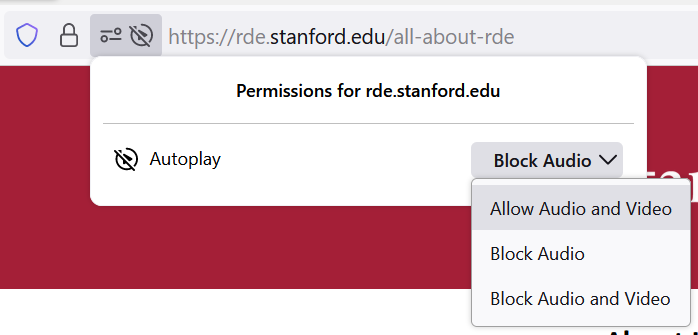
Stanford Dining
Health & Safety
Stanford Dining Health & Safety comprises four critical programs that help to support the academic mission of the university by providing the highest standards of food and workplace safety in the dining halls: CleanDining, Food Safety, Workplace Safety and Environmental Compliance.
On This Page:

Daniel E. Archer, MPH, REHS
Senior Associate Director of Food Workplace Safety & Quality Assurance
daniel.archer@stanford.edu

Bai Li, CP-FS
Health and Safety Specialist
baili@stanford.edu

Yuma Argo, MPH, REHS
Health and Safety Specialist
yumaa@stanford.edu
.
CleanDining
At the onset of the COVID-19 pandemic, Stanford Dining Hospitality & Auxiliaries developed the CleanDining Program which assured students of the safety of their dining experience through enhanced cleanliness that was visible to students. Learn more.
R&DE Food Safety Program
R&DE prides itself on creating a culture of excellence which requires a high standard of food safety and sanitation. The award-winning R&DE Food Safety Program achieves this high standard of food safety by setting stringent food safety guidelines, communicating food safety frequently, conducting regular food safety training/certifications and audits, encouraging active managerial control, and executing our food safety Sanitation Standard Operating Procedures (SSOPs). The R&DE Food Safety Program plays a critical role to ensure that food served to students in Stanford Dining Hospitality & Auxiliaries is not only delicious and nutritious but wholesome and safe to prevent foodborne illness. Learn more about R&DE’s standards for being a leader in food safety.
Food Safety Training
All staff members are required to practice safe food handling procedures when working in R&DE. To ensure this, we offer continuous food safety training and education programs consisting of mandatory quarterly training sessions. The training sessions cover physical, chemical, and biological food safety hazards, pathogens that cause foodborne illness, reportable foodborne illnesses, factors that contribute to foodborne illness, prevention of foodborne illness, active managerial control to prevent foodborne illness, temperature control, preventing cross-contamination, equipment cleanliness, and health alert protocols. Additionally, our managers and chefs are ServSafe certified, and all employees have a Food Handler’s card, certified through our own online web portal in partnership with StateFoodSafety. Our dining staff undergo rigorous and continuous training on the latest food safety principles and regulations.
In-House Audits
The R&DE Food Safety Program conducts unannounced monthly food safety inspections in all R&DE food establishments to ensure compliance with our very high food safety standards and county regulations. On a daily basis, the R&DE Food Safety Program performs spot audits in the dining units to ensure proper temperature control, good employee personal hygiene, food contamination prevention methods, equipment cleanliness, and code compliance. During these daily visits, our Health and Safety Specialists provide on the spot staff training and review food safety policies and procedures when necessary.
HACCP Principles
Stanford Dining Central Production Kitchen uses reduced oxygen packaging processes in the food production which require a Hazard Analysis Critical Control Point (HACCP) plan. In March 2014, the California Department of Public Health approved Stanford’s Residential & Dining Enterprise’s HACCP plan making Stanford the first university in California to attain a state-approved HACCP plan. A HACCP plan is a written plan that outlines a systematic preventative approach to food safety from biological, chemical and physical hazards in the food production process that can cause the finished product to be unsafe and designs measures to reduce these risks to safe levels. All dining locations apply HACCP principles in their operations.
Health Alert Protocols
R&DE Food Safety Program along with Stanford Student Housing collaborates with Vaden Health Center to swiftly implement a set of cleaning protocols including super sanitization in dining and retail units to prevent the spread of disease when a health alert is indicated.
Illness Questionnaire & Consultation
Email us at foodsafety@stanford.edu with comments and questions on food safety. To report potential foodborne illness, please complete this Illness Questionnaire.
R&DE Workplace Safety Program
“Value Safety in the Workplace” is a core value of Stanford University Residential & Dining Enterprises (R&DE). Employees are encouraged to strive to achieve excellence in their work daily and this includes maintaining a safe work environment and applying safe workplace practices to prevent injuries.
R&DE Code of Safe Workplace Practices Manual
R&DE Workplace Safety Program has outlined in this manual the best practices for safety that must be practiced by all Stanford Dining and Stanford Hospitality & Auxiliaries food service employees to prevent the most common hazards in the workplace. Employees are encouraged to report any sign of potential hazard, near misses and injuries to their General Manager, Chef or Supervisor for immediate corrective action.
Workplace Safety Training
Employees are trained quarterly on the most common workplace safety hazards including Heat Illness prevention. R&DE Workplace Safety Program collaborates with University EH&S to provide strain injury prevention, incident reporting and casual analysis training. Monthly safety talking points on injury hazards are provided to dining managers to be discussed with team members at the weekly meetings.
Job Safety Analysis
R&DE Food Safety and Workplace Safety Program has worked with Zurich Insurance Risk Engineer to develop Job Safety Analysis for tasks performed by Food Service Workers in Stanford Dining and Stanford Hospitality & Auxiliaries. Each Job Safety Analysis outlines the job steps, safety hazards associated with the tasks and recommended safety procedures to be followed to prevent injury to team members.
The Workplace Safety Program has also collaborated with Zurich Insurance to develop an Injury and Illness Prevention Program for Stanford Dining and Stanford Hospitality & Auxiliaries in compliance with Cal-OSHA regulations.
Collaboration with EH&S
The Workplace Safety Program collaborates with University EH&S on training dining and hospitality managers on the Stanford University Injury and Illness Prevention Program and providing ergonomic evaluation of work conditions.
